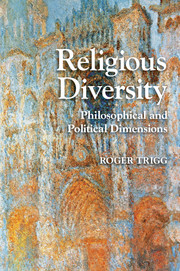Book contents
- Frontmatter
- Dedication
- Contents
- Introduction
- 1 The Challenge of Religious Diversity
- 2 Do Religions Claim Truth?
- 3 Religious Pluralism
- 4 The Roots of Religious Belief
- 5 Does Disagreement Undermine Theism?
- 6 Education and Religious Diversity
- 7 Truth and Coercion
- 8 Religious Diversity and Identity
- 9 Religion as Personal Preference
- 10 Freedom and Religion
- Bibliography
- Index
- References
3 - Religious Pluralism
Published online by Cambridge University Press: 05 June 2014
- Frontmatter
- Dedication
- Contents
- Introduction
- 1 The Challenge of Religious Diversity
- 2 Do Religions Claim Truth?
- 3 Religious Pluralism
- 4 The Roots of Religious Belief
- 5 Does Disagreement Undermine Theism?
- 6 Education and Religious Diversity
- 7 Truth and Coercion
- 8 Religious Diversity and Identity
- 9 Religion as Personal Preference
- 10 Freedom and Religion
- Bibliography
- Index
- References
Summary
DIVINE REALITY AND TRUTH
Claiming that reality – any reality – is of a particular nature immediately excludes rival views from being true. Once something is said to be true, alternatives are ruled out. If I say it is raining, I cannot reasonably say it is not. A major function of language should be to communicate states of affairs to others. Assertions must concern truth, and they carry with them implicit denials. Otherwise, language may become not much more than a series of inarticulate sounds, like groans. The verificationists thought religious language was like that precisely because they thought that proper language should communicate truths and identify falsehoods. They needed evidence from the senses to decide which was which, and religious language seemed impervious to that.
That narrowed the idea of truth and falsehood, as well as the concept of meaning that they tied to those notions, in an arbitrary manner. However, the later Wittgenstein's solution was, in a sense, worse. By tying our ideas of reality to the difference such beliefs make in our lives, he was led to accept that there may be in effect as many “realities” as there are identifiable ways of life. D. Z. Phillips claims that realism distorts the “natural setting” of belief. For him, the sense of religious beliefs “is not given independently of the mode of projection in which they have their natural home.” What we mean depends on how we live. This is why for Phillips the idea of “really believing” is more important than believing what is real. The sense of the latter can only be given by the use of terms embedded in our actions. We can never have wrong beliefs about what is real, because the latter has no independent existence. Belief and practice can never be prized apart. Whether we really believe and are sincere in our practices is one thing, but we cannot be proven wrong by “reality” being brandished in front of us. One cannot sever belief from its “object,” because, as Phillips claims, “realism ignores the context in which the relation between belief and its object has its sense.”
- Type
- Chapter
- Information
- Religious DiversityPhilosophical and Political Dimensions, pp. 42 - 59Publisher: Cambridge University PressPrint publication year: 2014

